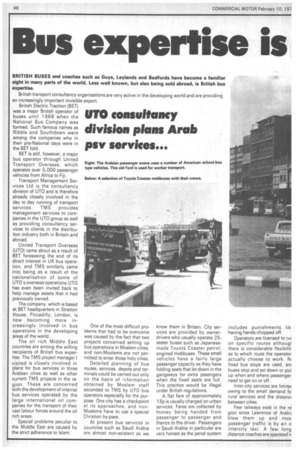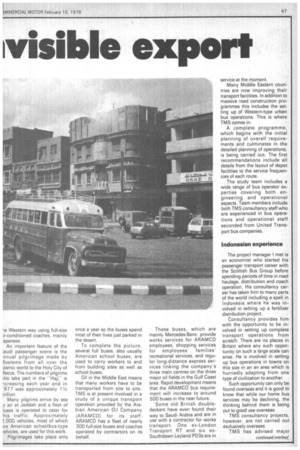Bus expertise is 'visible export
Page 48

Page 49

Page 50

If you've noticed an error in this article please click here to report it so we can fix it.
BRITISH BUSES and coaches such as Guys, Leylands and Bedfords have become a familiar sight in many parts of the world. Less well known, but also being sold abroad, is British bus expertise.
British transport consultancy organisations are very active in the developing world and are providing an increasingly important invisible export.
British Electric Traction (BET) was a major British operator of buses until 1 968 when the National Bus Company was formed. Such famous names as Ribble and Southdown were among the companies who in their pre-National days were in the BET fold.
BET is still, however, a major bus operator through United Transport Overseas, which operates over 5,000 passenger vehicles from Africa to Fiji.
Transport Management Services Ltd is the consultancy division of UTO and is therefore already closely involved in the day to day running of transport services. TMS provides management services to companies in the UTO group as well as providing consultancy services to clients in the distribution industry both in Britain_and abroad.
United Transport Overseas (UTO) came about as a result of BET foreseeing the end of its direct interest in UK bus operation, and TMS similarly came into being as a result of the nationalisation of some of UTO's overseas operations.UTO has even been invited back to help manage assets that it had previously owned.
The company, which is based at BET headquarters in Stratton House, Piccadilly, London, is now becoming more increasingly involved in bus operations in the developing areas of the world.
The oil rich Middle East countries are among the willing recipients of British bus expertise. The TMS project manager I visited is closely involved in plans for bus services in three Arabian cities as well as other current TMS projects in the region. These are concerned with the development of internal bus services operated by the large international oil companies for the transport of their vast labour forces around the oil rich areas.
Special problems peculiar to the Middle East are caused by the strict adherence to Islam. One of the most difficult problems that had to be overcome was caused by the fact that two projects concerned setting up bus operations in Moslem cities, and non-Moslems are not permitted to enter those holy cities.
Detailed planning of bus routes, services, depots and terminals could be carried out only on the basis of mformation obtained by Moslem staff seconded to TMS by UTO bus operators especially for the purpose. One city has a checkpoint at its approaches, and nonMoslems have to use a special Christian by-pass.
At present bus services in countries such as Saudi Arabia are almost non-existent as we know them in Britain. City services are provided by ownerdrivers who usually operate 25seater buses such as Japanesemade Toyota Coaster petrolengined midibuses. These small vehicles have a fairly large passenger capacity as they have folding seats that let down in the gangways for extra pssengers when the fixed seats are full. This practice would be illegal under British regulations.
A flat fare of approximately 15p is usually charged on urban services. Fares are collected by money being handed from passenger to passenger and thence to the driver. Passengers in Saudi Arabia in particular are very honest as the penal system includes punishments I k: having hands chopped off.
Operators are licensed to rur on specific routes althougl there is considerable flexibilit as to which route the operator actually choose to work NI fixed bus stops are used, am buses stop and set down or picl up when and where passenger: need to get on or off.
Inter-city services are limite( owing to the small demand to rural services and the distanct between cities.
Few railways exist in the re gion since Lawrence of Arabii blew them up and mos passenger traffic is by air o intercity taxi. A few long distance coaches are operated ir le Western way using full-size ir-conditioned coaches, mainly apanese.
An important feature of the iaudi passenger scene is the nnual pilgrimage made by /loslems from all over the .ilamic world to the Holy City of Aecca. The numbers of pilgrims iho take part in the "Hajj'' is icreasing each year and in 977 was approximately 11/2 nillion
Many pilgrims arrive by sea r air at Jeddah and a fleet of )uses is operated to cater for his traffic. Approximately ?,000 vehicles, most of which ire American schoolbus-type rehicles, are used for this work Pilgrimages take place only once a year so the buses spend most of their lives just parked in the desert.
To complete the picture, several full buses, also usually American school buses, are used to carry workers to and from building sites as well as school buses.
Oil in the Middle East means that many workers have to be transported from site to site. TMS is at present involved in a study of a unique transport operation provided by the Arabian American Oil Company (ARAMCO) for its staff. ARAMCO has a fleet of nearly 300 full-size buses and coaches operated by contractors on its behalf. These buses, which are mainly Mercedes-Benz, provide works services for ARAMCO employees, shopping services for employees' families' recreational services, and regular long-distance express services linking the company's three main centres on the three major oil fields in the Gulf Coast area. Rapid development means that the ARAMCO bus requirement will increase to around 500 buses in the near future.
Some old British doubledeckers have even found their way to Saudi Arabia and are in use with a contractor for works transport. One ex-London Transport RT and six exSouthdown Leyland PD3s are in service at the moment.
Many Middle Eastern countries are now improving their transport facilities. In addition to massive road construction programmes this includes the set ting up of Western-type urban bus operations. This is where TMS comes in.
A complete programme, which begins with the initial planning of overall requirements and culminates in the detailed planning of operations, is being carried out. The first recommendations include all details from the layout of depot facilities to the service frequencies of each route.
The study team includes a wide range of bus operator ex pertise covering both en gineering and operational aspects. Team members include both TMS consultancy staff who are experienced in bus operations and operational staff seconded from United Transport bus companies.
Indonesian experience
The project manager I met is an economist who started his passenger transport career with the Scottish Bus Group before spending periods of time in road haulage, distribution and coach operation. His consultancy career has taken him to many parts of the world including a spell in Indonesia where he was involved in setting up a fertilizer distribution project.
Consultancy provides him with the opportunity to be involved in setting up complete transport operations from scratch. There are no places in Britain where any such opportunity on such a large scale can arise. He is involved in setting up bus operations in towns on this size in an an area which is hurriedly adapting from one type of civilization to another.
Such opportunity can only be found overseas and it is good to know that while our home bus services may be declining, the thinking behind them is being put to good use overseas.
TMS consultancy projects, however, are not carried out exclusively overseas.
TMS has advised major continued overleaf
British bus operators including a Passenger Transport Executive on operational matters and Has undertaken projects in the Middle East, Europe, East and West Africa, South America and the Caribbean.
A British voice is provided by consultancy services which endeavour to provide a credible, unbiased service to discover the best bus operation that can fulfil the demands of the client.
While TMS makes every endeavour to support the British manufacturing industry it does so only when products offered are the most suitable for the job.
It cannot be prejudiced for or against any particular manufacturer as it sells itself on its credibility. Recommendations for chassis types are deter mined by availability, serviceability, reliability and suitability for prevailing condition.
Transport Management Services Ltd has by no means a monopoly in the transport con sultancy business. In the mass transit world the National Bus Company's consultancy division and London Transport International are among its chief competitors.
Continental competitors
Even British bus experts do not have it all their own way. Volvo from Sweden and Mercedes-Benz from Germany are among the European bus manufacturers who offer consultancy services.
A bus manufacturer, however, may appear likely to offer as unbiased a service as that offered by professional consultants of a transport operating company.
Being a bus operator is an advantage that neither the bus manufacturer nor the professional systems analysts and consultants can offer as it allows unique advantages such as setting up training courses in working environments, and it is here that companies such as TMS, and LTI score.
London Transport International last week, in fact, announced a £750,000 contract for advice on bus operation in Kuwait.
Kuwait has a bus fleet of about 1,000 vehicles, and this will probably double over the next four to five years. Discussions with the general manager of the Kuwait Transport Company, who in fact received part of his early training with London Transport, began about a year ago. LTI will advise on the improvement and expansion of bus operations in Kuwait.












































































































